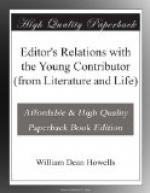People write because they wish to be known, or because they have heard that money is easily made in that way, or because they think they will chance that among a number of other things. The ignorance of technique which they often show is not nearly so disheartening as the palpable factitiousness of their product. It is something that they have made; it is not anything that has grown out of their lives.
I should think it would profit the young contributor, before he puts pen to paper, to ask himself why he does so, and, if he finds that he has no motive in the love of the thing, to forbear.
Am I interested in what I am going to write about? Do I feel it strongly? Do I know it thoroughly? Do I imagine it clearly? The young contributor had better ask himself all these questions, and as many more like them as he can think of. Perhaps he will end by not being a young contributor.
But if he is able to answer them satisfactorily to his own conscience, by all means let him begin. He may at once put aside all anxiety about style; that is a thing that will take care of itself; it will be added unto him if he really has something to say; for style is only a man’s way of saying a thing.
If he has not much to say, or if he has nothing to say, perhaps he will try to say it in some other man’s way, or to hide his own vacuity with rags of rhetoric and tags and fringes of manner, borrowed from this author and that. He will fancy that in this disguise his work will be more literary, and that there is somehow a quality, a grace, imparted to it which will charm in spite of the inward hollowness. His vain hope would be pitiful if it were not so shameful, but it is destined to suffer defeat at the first glance of the editorial eye.
If he really has something to say, however, about something he knows and loves, he is in the best possible case to say it well. Still, from time to time he may advantageously call a halt, and consider whether he is saying the thing clearly and simply.
If he has a good ear he will say it gracefully, and musically; and I would by no means have him aim to say it barely or sparely. It is not so that people talk, who talk well, and literature is only the thought of the writer flowing from the pen instead of the tongue.
To aim at succinctness and brevity merely, as some teach, is to practice a kind of quackery almost as offensive as the charlatanry of rhetoric. In either case the life goes out of the subject.
To please one’s self, honestly and thoroughly, is the only way to please others in matters of art. I do not mean to say that if you please yourself you will always please others, but that unless you please yourself you will please no one else. It is the sweet and sacred privilege of work done artistically to delight the doer. Art is the highest joy, but any work done in the love of it is art, in a kind, and it strikes the note of happiness as nothing else can.




